From Oscar of Between, Part 36A Excerpt
by Betsy Warland
Vancouver 2015
While Americans reluctantly admit “racial bias” exists, they believe they’re not racist.
The New York Times, January 10, 2015: “… young black men are shot dead by police at 21 times the rate of young white men.”
In Toronto, increasing “incidents” of police shooting and killing of unarmed black men.
A couple of months after this article, there is a mass killing of nine people at one of the oldest black churches in America by a white twenty-one-year-old man who told the minister he wanted to attend their Bible Study and prayer meeting.
Language our most devastating camouflage.
Within seconds: categorizing, racial profiling, “Sir” or “Ma’am.” Membership is how it works. Automatic positioning. What to expect. Who to trust. And not.
Where this takes us.
Oscar reading Claudia Rankine’s new book, Citizen: An American Lyric. On the back cover Marjorie Perloff writes: “These tales of everyday life … dwell on the most normal exteriors and the most ordinary of daily situations so as to expose what is really there: a racism so guarded and carefully masked as to make it all the more insidious.”
Category: “Logic. Any of the basic classifications into which all knowledge can be placed. In this sense, also called ‘predicament’.”
The category is our predicament.
Everyone not in our category is a not. This is the knot.
“… photographs of black victims of lynching taken between the 1880’s and 1930’s … show Americans grinning beneath the naked mutilated body of a black man or woman hanging behind them from a tree. The lynching photographs were souvenirs of a collective action whose participants felt perfectly justified in what they had done.”The New York Times, May 23, 2004.
The “grinning beneath” included children. These “souvenirs” were widely distributed throughout the U.S. like “Wish You Where Here” postcards.
Women strangers constantly assuming Oscar is a man:
“So sorry!”
“Oh, pardon me.”
“Sorry, you should go first.”
It’s staggering.
Staggering, when you stop to consider the implications of one category of people constantly having to apologize, give way to, another category of people. Apologize their whole life.
Category, camouflage, cruelty
: the co-dependent relationship among them.
Endless categories in which one individual or group must unfailingly be subservient to the other.
Oscar and Darrel are having lunch and talking about their manuscripts and each of their histories with betweenness. Oscar tells Darrel her betweenness began in childhood but she didn’t know how to express it then. Says, when she became a writer, her betweenness gradually came more into focus with her subject matter and lack of inclusion. As she developed her style of blending poetic strategies, exploration of ideas and narrative prose she grew to accept her solitariness. In telling this story, she found her narrative position: a person of between. Oscar finally isn’t obliged to category and its attendant allegiances. Isn’t at the mercy of its exclusions.
Darrel gets it. His talks about various aspects of his life as a Cree man and how in Oscar’s class, he discovered he’s a writer.
“It is only when one crosses a limit or a boundary that certain words are enunciated with clarity.”
Najwa Ali, Writing Toward a Distance
Oscar. Dwelling between urban apartment buildings and Stanley Park’s 1,000 acres of rainforest held by the sea.
For the first few weeks, Oscar and Ingrid take frequent long walks on the park’s trails then wander more and more off trail.
Off trail, it’s immediate.
It’s immediate. Categories of groomed trails, park map in hand and safety-maintained trees on either side give way to nature’s fervent instinct to survive, thrive, endlessly reinvent, redefine itself.
— in this here of between Oscar resides —

Photo credit: Ingrid Rose
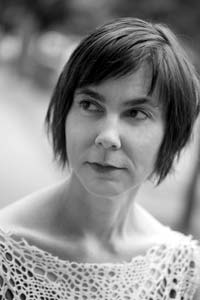
Photo credit: Mark Mushet
Guest Artist:
Jocelyn Morlock
Vancouver, BC
Web site: jocelynmorlock.com
Article about: Music on Main
Music: Exaudi by Jocelyn Morlock on SoundCloud
Recoiling at horror from the recent killings at Quebec mosque, and the bizarre and evil political situation nearby, I still have hope that human beings, despite everything, will follow their fervent instinct to survive, thrive, endlessly reinvent.
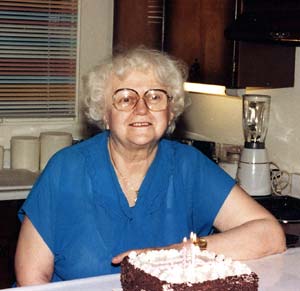
Marie Schmidt (Grandma) – photo credit: Jocelyn Morlock
I’m thinking about my grandmother, about her life and how it changed suddenly. She married very late, but was one of the rare few among her friends and relatives who were happy in their pairing. Life went on, by any account remarkably peacefully, until while still young, her husband died suddenly and her own life completely fell apart. In the depth of her loss she tried to throw herself into the grave with him.
Knowing that she would not find another partner that she could trust and respect in the same way, seeing how her friends’ marriages worked (men always the ones in control, women trying to scrape up enough money for weekly groceries, some were physically threatened, all were dependent) she grew to accept her solitariness and remained unmarried to the end of her life, gradually becoming at peace with her existence.
In my piece Exaudi (which means “listen,” and is commonly part of a Latin requiem phrase meaning “hear my prayer, all flesh shall come to you”) I wrote about her life – the shock of loss redefining what had been a distant religion for her, violently forcing meaning into these words. And afterwards, the slow process of redefinition, a gradual search for peace through change.
Exaudi, written by Jocelyn Morlock. This recording is of Ariel Barnes, solo cello, and musica intima vocal ensemble, conducted by Owen Underhill.
Featured Readers:
This month several readers are featured
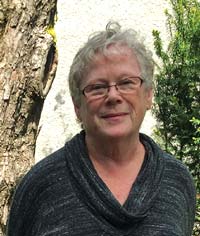
Photo credit: Gary Sill
Carole Harmon
Vancouver, BC
Web site: caroleharmon.ca
I read Oscar’s Salon because:
When I first entered Oscar’s Salon it was with my habitual shyness, not knowing if I belonged in an intimate space so articulated around gender issues which weren’t my own. I dipped in and out. Gradually I realized I was in a lake of complex currents of identity: sexuality yes, but also cultural identity, political, the natural world–overlapping without blending. I’ve enjoyed the intimacy of Oscar as book, the immediacy of Oscar reading, but the deep satisfaction of Oscar’s Salon is incomparable. A space of witnessing and being witnessed. Phrases echo, “dressed to kill” reminds me of another expression of my mother, “fit to be tied”– both dark allusions to realities no amount of science and knowledge have allowed us to surmount; “witness and presence”–how I see Oscar’s Salon. Refuse the verb and refuse the noun. Fear of the other. I’ll miss Oscar’s Salon, a place to be without camouflage.
Profile
Carole Harmon is a graduate of TWS 2016 Poetry and Lyric Prose, studying with mentor Meredith Quartermain. She has studied writing in workshop with Ingrid Rose, Betsy Warland, and Jami Macarty. Carole is working on a manuscript of poetry and lyric prose centred around inter-species co-operation which she will further explore in VMI 2017 with Betsy Warland as mentor. Her writing has appeared in Emerge 2016, Wondering Who you Are, the interactive blog of Sonya Lea, Featured Reader in Oscar’s Salon, and in the handmade artist’s book, Unsung: Poems | Images. Carole grew up in Banff National Park and has explored our understanding of nature through photography and collage. Her photography has appeared in books and exhibitions of Canadian Rockies photography and history, most recently A Delicate Art, Artists, Wildflowers and Native Plants of the West by Mary-Beth Laviolette.
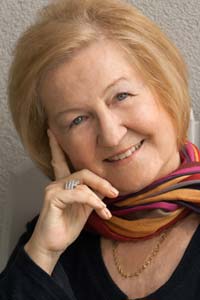
Photo credit: Ayelet Tsabari
Cullene Bryant
North Vancouver, BC
Web site: cullenebryant.com
I read Oscar’s Salon because:
I am a loyal follower of Betsy’s fabulous work.
Profile
Bryant is a graduate of The Writer’s Studio, Simon Fraser University, 2010. Her two collections of short fiction, Llamas In The Snow and In the Dry Woods were published by The Books Collective in Edmonton. In The Dry Woods, the story after which the collection is named won a national prize. Her prose and poetry have appeared in various literary journals. Some of these include: The Dalhousie Review, The Nashwaak Review, The Santa Fe Review and Carousel. In 2017 her collection of poetry God Is A Laughing Bedouin will be published by Inanna Press.
Bryant holds a Doctor of Ministry degree and has spent most of her working life as a hospital chaplain. Many of her short stories are based on the patients and relatives she met. She has never lived out the stereotype of a clergy person and has straddled between the sacred and the secular worlds with dexterity.
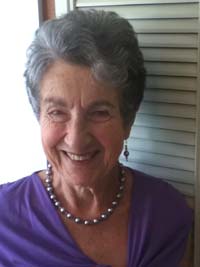
Photo credit: unknown
Helen Waldstein Wilkes
Vancouver, BC
Web site: helenwaldsteinwilkes.com
I read Oscar’s Salon because:
it provides such a sharp lens on the culture that shapes each of us.
Profile
Helen Waldstein Wilkes is an accomplished educator whose spoken words have inspired students of all ages. Her gift for innovative imagery coupled with her academic incisiveness lends colour and clarity to her writing. Her first book, Letters from the Lost won both the Alberta Readers’ Choice Award and the Edna Staebler Award for Canadian non-fiction. Letters from the Lost gained international recognition when it was chosen by Osburg Verlag for publication in German. It is among only a handful of Canadian books in its category to have been selected and widely distributed to schools, libraries and booksellers throughout Germany, Austria and Switzerland.
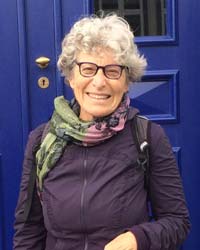
Photo credit: Betsy Warland
Ingrid Rose
Vancouver, BC
Web site: ingridrose.com
I read Oscar’s Salon because:
it’s like antennae for the human race!
Profile
after many years of working & not on a memoir, have finally taken plunge & begun with guidance of rachel rose to see what form needs to emerge from collage of 131-paged manuscript. have been facilitating creative writing classes at sfu, trout lake community centre & providing space for writing from the body in my home studio. embodied writing is what i aspire to as well as thoughtful, meaningful, surprising, challenging.
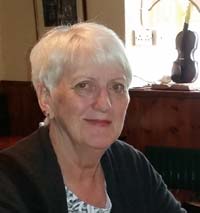
Photo Credit: Fergus Flood
Joan B Flood
Vancouver, BC
Web site: joanbflood.com
I read Oscar’s Salon because:
The exploration of ‘other’ was deeply interesting. The intersection of ‘other’ and various oppressions, both those from without and from within, resonated with me, as did Oscar’s efforts to identify and name the various camouflages with which we all cover ourselves. How simple and profound these camouflages can be. I wear lipstick to hide the creeping vitiligo on my lips. When I was younger and had very short hair I always wore prominent earrings to say, ‘yeah, I’m a dyke but look at me, I’m ok, really.’ Both harm and defence against harm indeed. Oscar has been beautiful and painful to dive into.
Profile
Joan B. Flood was born in Ireland and lived briefly in France and England before settling in Canada. A graduate of SFU’s The Writer’s Studio (TWS), and a mentor at TWS’s Southbank Writer’s Program, she does manuscript consults, both privately and through TWS outreach programs with Vancouver Public Library and Surrey Central Library. Her poetry, short fiction, and non-fiction have been published in anthologies in Canada, the US, and Australia. Her story 87 won honourable mention in The Binnacle Ninth Annual Ultra-Short Story Competition 2012.
Her YA novel New Girl was released by Musa Publishing in October 2012. She has now completed a novel for adults – a story of a woman trying to come to terms with her past – and has two new writing projects on the go.
She spends time in nature, visits art galleries, photo exhibits and modern dance to keep herself curious and her creative life keen.

Photo credit: www.klutchphotography.com
Linda Vogt Turner
Vancouver, BC
Web site: lindavogtturner.ca
I read Oscar’s Salon because:
I admire and respect Betsy Warland. I have learned a lot from Betsy and wish to continue learning from her and her team and their community of writers. Without Betsy’s encouragement and editorial skills, I would never have attempted the writing of my now published book “The Ecumenical Affair.”
Profile
Linda Vogt Turner is a lay theological writer and educator living in Vancouver. Linda has written extensively on faith and eco-justice issues. She completed her master of arts liberal studies degree at Simon Fraser University (SFU) in 2011. The title of her master of arts thesis project is Mary Magdalene: Her image and relationship to Jesus. Full text is available online at lindavogtturner.ca/papers.html
Who Mary Magdalene is matters to Linda. Linda sees her as the Woman who had an affair with Jesus the Teacher and rose with him to tell their story as Good News because for Linda Love is what resurrects us and revives us and brings us to life eternally. Was the Teacher Mary Magdalene’s stag at the wedding feast? Or was there someone else craving her Jesus Woman’s body? Read The Ecumenical Affair or Linda’s blog and decide for yourself.
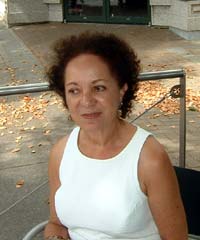
Photo credit: unknown
Lois Keane
West Vancouver, BC
Web site: loiskeaneflowers.com
I read Oscar’s Salon because:
It is so rare to encounter such honesty. I love the unconventional ‘thoughtscapes’ and the form. I love Betsy.
Profile
How to define a profile that feels like it’s in the making? I write, yes. Have always loved to write – the reasoning, the immersion, the solutions that wait to be prodded by the pen. And always, the close companion to writing – my hunger for other people’s words. And none as inspiring as Betsy’s, (corny but true).
Her rebel-writing, her unlikely metaphors. (You can breathe a page and also call a single word a page!) Her daring and brilliance in inventing the rules. And her steady commitment to sharing and mentoring – as moving as Obama’s Yes We Can!
And now the challenge – of between. In the face of such unparalleled honesty, how to escape self-examination? Growing up with mixed heritage in a British colony, true, camouflage was our very skin.
What would it look like if we all declared, this is who I am?
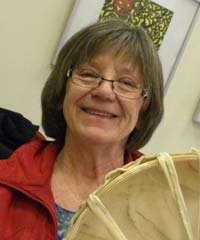
Photo credit: Theresa Gladue
Marilyn Belak
Dawson Creek, BC
Marilyn at Leaf Press
I read Oscar’s Salon because:
I shared the ‘in between’ persona / space concept with Betsy during my VMI year. Oscar Salon is the first on line written arts project that has engaged me and led me to expanded imagining of this space.
Profile
In addition to VMI, I’ve attended Banff Wired Writing, Sage Hill and a myriad of other writing retreats. At the end of April I am scheduled to participate in Enlichenment, Enlivenment and the poetics of place with Marlene Creates, Don McKay and Gower which further explores revisioning place and aliveness. My poetry and writing is published in literary journals, anthologies and personal chap books.
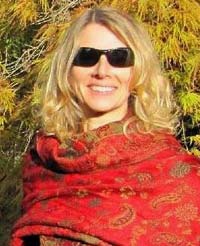
Photo credit: K. Key
Morgan Chojnacki
Vancouver, BC
Web site: morganchojnacki.com
I read Oscar’s Salon because:
Oscar’s mind is transparent, and the gift of no-self breaks ideas across the page, holds them to the light of persistent and careful inquiry. Whether tender or brutal, the real comes into focus. Oscar’s mindful investigation feeds my spirit, spurs me to strive to embody the challenge, discomfort, thrill of exploring territories that feel familiar, seductively so, and unknown, blisteringly so. The tension of the two – a call to awaken. Competing urgencies in public and private spheres call for my attention. When I turn to Oscar’s Salon, I feel responsible to attend deeply to my own mind, to my connection with others, the wider world. As when Oscar encounters her life, makes discoveries, her countless, cumulative sightings, like her ultimate home “– in the here of between Oscar resides –” This quality of alert cherishing. A prompt toward a direct, active meditation, as when I walk in forests and on beaches, when I put my hands in the earth of my garden, when I write the stories for family members who will never have the chance. These acts share a simple contact with the moment, and I attempt to breathe into it, to breathe into it, to let revelations surface.
Profile
Originally from Quebec, I live in Vancouver where I work on writing projects for the joy of it and for a living, sometimes both at once. A TWS graduate. I have published fiction and non-fiction in several anthologies. I recently completed a novel, Keep Carry On, set in Quebec, about a plucky 16-year-old girl from an immigrant family of Polish-Jewish origins who finds inspiration in Bruce Lee, takes up karate, and learns to practice courage in the face of family fears and the weight of history. While I look for a publisher for my first novel, I have started writing my second, fuelled by an online writing course through UBC.

Photo credit: Leah Moss
Trace Wilson
Lions Bay, BC
I read Oscar’s Salon because:
Vibrant writing from inspiring writers I admire. The content is innovative and speaks to my soul about the human condition with boldness. I enjoyed Anne Stone’s writing–she was my Creative Writing teacher at CapU.
Profile
Trace Wilson is a graduate of The Writer’s Studio at SFU. TWS-2014 and has been published in The Liar 2013-2014, in Emerge-14 and short-listed for a Geist Award. Trace continues with graduate work at SFU, on her poetry through manuscript intensive and weekend programs with Fiona Lam and Evelyn Lau.




Frequently (and I think I can use this plural pronoun), we are at a loss for words yet we press on with language that falls short; is not infrequently even profoundly inaccurate. I knew I wanted to end the salon with music of a composer and that that composer was Jocelyn. Her moving text was a bonus! The act of deep listening & acceptance of one’s essential solitariness have been Oscar’s “guides.” The Featured Readers’ comments this month reveal so much about a writer & reader’s visceral struggle with language which, in turn, is one’s place in the world. The place of between. Since December 2012, TO ALL of you who have participated in Oscar’s Salon–in obvious and not obvious ways—please accept my gratitude. I have relished every minute of
…it!